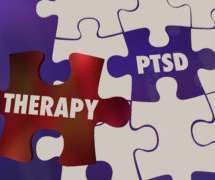Rethinking the sufficient dose needed for PTSD treatment
Society of Clinical Psychology
MAY 11, 2018
Denise Sloan and Brian Marx discusses findings from a recent study published in JAMA Psychiatry that compares the effectiveness of a brief exposure-based therapy for PTSD with Cognitive Processing Therapy with implications for finding the ‘right treatment dose’ for reducing symptoms. Watts et al.). 2012; Nacasch et al.,












Let's personalize your content